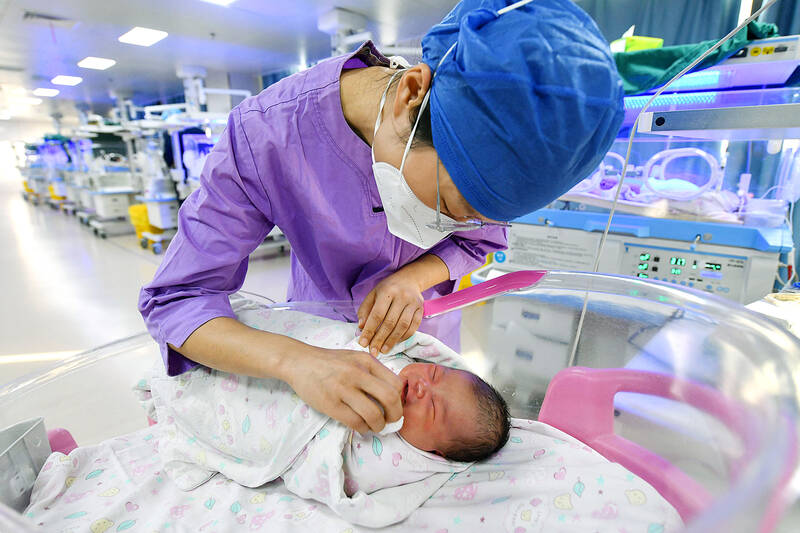China yesterday announced its first population decline in decades as what has been the world’s most populous nation ages and its birthrate plunges.
The Chinese National Bureau of Statistics reported that the country had 850,000 fewer people at the end of last year than the previous year.
The tally includes only the population of mainland China, excluding Hong Kong and Macau, as well as foreign residents.

Photo: AFP
That left a total of 1.41 billion people, with 9.56 million births against 10.41 million deaths, the bureau said in a news briefing.
Men outnumbered women by 722.06 million to 689.69 million, a result of the one-child policy that officially ended in 2016 and a traditional preference for male offspring to carry on the family name.
Since abandoning the policy, China has sought to encourage families to have second or even third children, with little success, reflecting attitudes in much of East Asia where birthrates have fallen precipitously.
In China, the expense of raising children in cities is often cited as a cause.
China has long been the world’s most populous nation, but is expected to soon be overtaken by India, if it has not already.
Estimates put India’s population at more than 1.4 billion and continuing to grow.
The last time China is believed to have recorded a population decline was during the Great Leap Forward launched at the end of the 1950s, under Mao Zedong’s (毛澤東) drive for collective farming and industrialization that produced a massive famine killing tens of millions of people.
China’s population has begun to decline nine or 10 years earlier than Chinese officials and the UN projected, said Yi Fuxian (易富賢), a demographer and expert on Chinese population trends at the University of Wisconsin-Madison.
That means that China’s “real demographic crisis is beyond imagination and that all of China’s past economic, social, defense and foreign policies were based on faulty demographic data,” Yi said.
Based on his own research, China’s population has actually been declining since 2018, showing the population crisis is “much more severe” than previously thought, he said.
China now has one of the lowest fertility rates in the world, comparable only to Taiwan and South Korea, he added.
China’s looming economic crisis will be worse than Japan’s, where years of low growth have been blamed in part on a shrinking population, Yi said.
“China has become older before it has become rich,” he said.

The combined effect of the monsoon, the outer rim of Typhoon Fengshen and a low-pressure system is expected to bring significant rainfall this week to various parts of the nation, the Central Weather Administration (CWA) said. The heaviest rain is expected to occur today and tomorrow, with torrential rain expected in Keelung’s north coast, Yilan and the mountainous regions of Taipei and New Taipei City, the CWA said. Rivers could rise rapidly, and residents should stay away from riverbanks and avoid going to the mountains or engaging in water activities, it said. Scattered showers are expected today in central and

People can preregister to receive their NT$10,000 (US$325) cash distributed from the central government on Nov. 5 after President William Lai (賴清德) yesterday signed the Special Budget for Strengthening Economic, Social and National Security Resilience, the Executive Yuan told a news conference last night. The special budget, passed by the Legislative Yuan on Friday last week with a cash handout budget of NT$236 billion, was officially submitted to the Executive Yuan and the Presidential Office yesterday afternoon. People can register through the official Web site at https://10000.gov.tw to have the funds deposited into their bank accounts, withdraw the funds at automated teller

COOPERATION: Taiwan is aligning closely with US strategic objectives on various matters, including China’s rare earths restrictions, the Ministry of Foreign Affairs said Taiwan could deal with China’s tightened export controls on rare earth metals by turning to “urban mining,” a researcher said yesterday. Rare earth metals, which are used in semiconductors and other electronic components, could be recovered from industrial or electronic waste to reduce reliance on imports, National Cheng Kung University Department of Resources Engineering professor Lee Cheng-han (李政翰) said. Despite their name, rare earth elements are not actually rare — their abundance in the Earth’s crust is relatively high, but they are dispersed, making extraction and refining energy-intensive and environmentally damaging, he said, adding that many countries have opted to

PEACE AND STABILITY: Maintaining the cross-strait ‘status quo’ has long been the government’s position, the Ministry of Foreign Affairs said Taiwan is committed to maintaining the cross-strait “status quo” and seeks no escalation of tensions, the Ministry of Foreign Affairs (MOFA) said yesterday, rebutting a Time magazine opinion piece that described President William Lai (賴清德) as a “reckless leader.” The article, titled “The US Must Beware of Taiwan’s Reckless Leader,” was written by Lyle Goldstein, director of the Asia Program at the Washington-based Defense Priorities think tank. Goldstein wrote that Taiwan is “the world’s most dangerous flashpoint” amid ongoing conflicts in the Middle East and Russia’s invasion of Ukraine. He said that the situation in the Taiwan Strait has become less stable